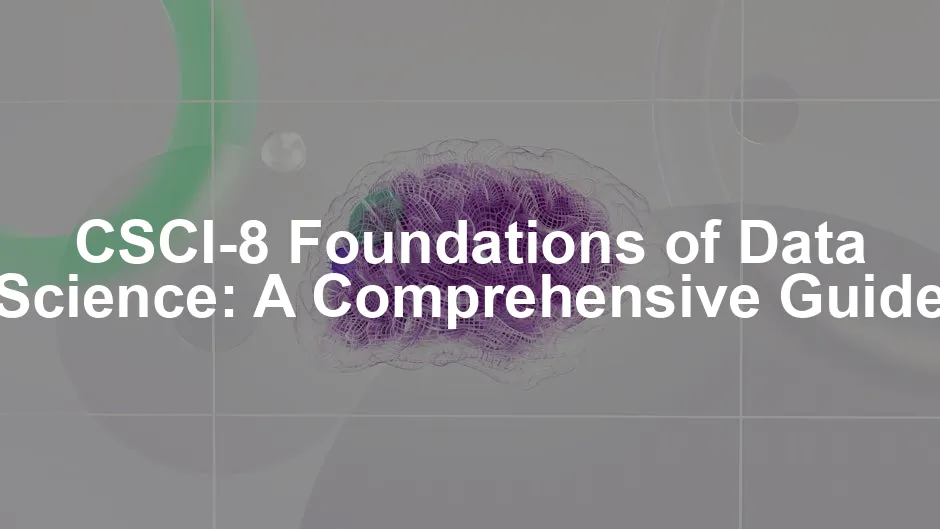Introduction
CSCI-8 is a key course in understanding data science. It welcomes students from all academic disciplines. This course equips learners with essential skills for real-world data analysis. You’ll find its practical applications valuable in various fields.
Summary and Overview
CSCI-8 covers three main areas: inferential thinking, computational thinking, and real-world relevance. Students learn to analyze data through hands-on experience, using actual datasets. This practical approach reinforces theoretical concepts, ensuring students can apply what they learn.
The course emphasizes the significance of data science in modern education. It helps students develop core skills in data analysis and programming. Importantly, CSCI-8 is designed for everyone, requiring no prior coding or statistics experience. High school algebra is the only prerequisite, making it accessible for diverse learners. Whether you’re from humanities or sciences, this course prepares you for future challenges in data-driven environments. For more insights on effective data analysis, check out tips for effective data analysis in economics and statistics.

To dive deeper into the fundamentals of data science, consider picking up Computational and Inferential Thinking: The Foundations of Data Science. This textbook provides a solid foundation for understanding the core concepts of data science and is perfect for beginners.
The practical applications of data science are vast and relevant in today’s world. Explore effective data analysis strategies that can enhance your learning.
Course Structure and Prerequisites
Course Format
CSCI-8 is structured to maximize learning through interactive sessions. Each week, students attend three hours of lectures and three hours of lab work. These labs allow for hands-on practice with real data.
Students should expect to dedicate around 10 hours weekly to coursework. This includes lecture attendance, lab completion, and project work. Assignments are designed to reinforce concepts learned in class.

Assessment methods include participation, homework, projects, and exams. The course has a strong track record, with high passing rates and student satisfaction. Many have gone on to apply their skills in various fields after completing CSCI-8.
Prerequisites
Before enrolling in CSCI-8, students should have a solid grasp of high school algebra. This foundational math skill is essential for tackling data analysis concepts. However, there’s no need for advanced statistics or prior programming experience. This course is crafted for everyone, regardless of their major. Whether you’re studying humanities, sciences, or any other field, your background won’t hinder your success. We encourage students from all disciplines to join. The skills learned here will benefit you in various career paths and everyday problem-solving. So, don’t hesitate; this course is designed with you in mind!

To further support your learning, you might want to explore Python Crash Course: A Hands-On, Project-Based Introduction to Programming. This book will help you grasp the programming concepts that are essential for data analysis.
Core Concepts Covered in CSCI-8
Inferential Thinking
Inferential thinking is a key aspect of data science, enabling us to draw conclusions from data samples. This concept is rooted in statistical inference, which helps us make predictions or decisions based on data analysis. For example, we often use inferential statistics to estimate population parameters from sample data. Understanding how to interpret data is crucial for making informed decisions in various fields. By mastering inferential thinking, you will gain the ability to analyze and understand trends, making your insights more impactful and relevant. This skill is vital for anyone looking to work with data in a meaningful way.

If you’re keen to learn more about statistical learning, I highly recommend An Introduction to Statistical Learning: with Applications in R. This book provides practical applications of statistical learning that can enhance your understanding of data science.
Computational Thinking
Computational thinking is another cornerstone of data analysis, focusing on problem-solving using computational methods. In CSCI-8, students learn basic programming concepts, especially in Python. This language is widely used in data science due to its simplicity and versatility. You’ll gain hands-on experience by tackling real-world problems through coding. For instance, you might write a simple program to analyze a dataset or visualize trends. By applying computational thinking, you develop a structured approach to solving complex problems, making you better equipped for challenges in any field. This blend of skills will enhance your analytical capabilities immensely. For a deeper understanding of statistical learning with Python, refer to an introduction to statistical learning with Python book length.

Understanding Python programming is crucial for data analysis. Learn more about statistical learning with Python.
Real-World Relevance
Understanding data science isn’t just academic; it’s deeply practical. This course prepares you to tackle real-world challenges using data-driven insights. For instance, students analyze economic data, shedding light on market trends and consumer behavior. Social network datasets allow you to explore interactions among users, revealing patterns in communication and connection.

In class projects, students might examine how social media influences public opinion during elections. Another project could involve investigating how economic indicators affect employment rates. These examples illustrate the course’s focus on essential concepts that apply across various fields, from business to social sciences.
Data science empowers you to make informed decisions based on actual data. Whether you’re looking to improve business strategies or understand societal trends, the skills gained here will be invaluable. By engaging with real datasets, you gain practical experience that enhances your ability to solve complex problems in everyday life. To help visualize your data, consider investing in Data Visualization: A Practical Introduction. This book will give you essential techniques for presenting data effectively.
Support and Resources
Course Support
Support is crucial for success in CSCI-8. Students have access to various resources, including tutoring sessions, office hours, and online forums. This collaborative environment fosters community and encourages you to seek help when needed. Engaging with peers and instructors can clarify concepts and enhance your understanding.

Utilizing these support systems can significantly improve your learning experience. Don’t hesitate to reach out for assistance; it’s a vital part of mastering the course material. Remember, everyone is here to help you succeed, so take advantage of these resources.
Course Materials
Essential materials for CSCI-8 include the primary textbook, Computational and Inferential Thinking: The Foundations of Data Science. This book provides foundational knowledge crucial for the course. Students will also use online platforms like data8.datahub.berkeley.edu for labs and assignments.

Familiarity with Python is necessary, as it’s the primary programming language used throughout the course. Make sure you have access to a laptop or computer, as hands-on practice is vital for mastering the concepts. Having the right tools and resources will set you up for success in your data science journey. If you’re looking for a great starter kit, check out the Raspberry Pi 4 Model B (4GB RAM) – Starter Kit. It’s an excellent tool for hands-on programming practice.
Student Feedback and Outcomes
Testimonials
Past students of CSCI-8 often share positive experiences. Many express how the course transformed their understanding of data. One student said, “Data science helped me ask better questions.” Another remarked, “I now feel confident analyzing datasets for my research.” These testimonials highlight the course’s impact on critical thinking. Students report gaining valuable skills like data analysis and programming. These abilities are not only beneficial academically but also enhance employability. Graduates feel prepared to tackle real-world data challenges, setting them apart in competitive job markets.

To further enhance your data analysis skills, consider reading Data Science for Business: What You Need to Know about Data Mining and Data-Analytic Thinking. This book will help you understand how to use data science effectively in a business context.
Career Opportunities
Completing CSCI-8 opens doors to various career paths. Students can pursue roles like data analyst, business intelligence analyst, or data scientist. Each of these roles leverages skills learned in the course, such as programming and statistical analysis. Companies across industries, including finance, healthcare, and technology, seek professionals with data science expertise. The foundational knowledge gained in CSCI-8 makes graduates attractive candidates. Employers value the ability to draw insights from data, driving data-driven decision-making. This course not only equips you with essential skills but also enhances your employability in today’s job market. For those interested in becoming a data analyst, check out the comprehensive guide to becoming a data analyst.

Exploring career opportunities in data analysis can be exciting. Discover the skills, tools, and career paths available for aspiring data analysts.
Conclusion
CSCI-8 is crucial for building foundational skills in data science. This course provides essential knowledge for analyzing data effectively. It prepares students for diverse career opportunities in various industries. If you want to enhance your understanding of data analysis, consider enrolling in CSCI-8. Taking this step will empower you to navigate the growing field of data science with confidence and competence.

For those who want to further explore data science, I recommend The Big Book of Data Science: A Comprehensive Guide to Data Science. This book covers a wide range of topics in data science and is perfect for those looking to broaden their knowledge.
FAQs
What prior knowledge is required to take CSCI-8?
No advanced knowledge is necessary for CSCI-8. A solid understanding of high school algebra is sufficient. This course welcomes everyone, regardless of major. If you’re curious about data science, we encourage you to enroll!
What programming language is primarily used in this course?
Python is the main programming language taught in CSCI-8. It’s widely used for data analysis due to its simplicity. You’ll learn essential programming skills that empower you to tackle real-world applications.
How is the course assessed?
CSCI-8 assesses students through various components. These include projects, exams, homework, and class participation. Each element helps ensure you grasp the concepts and gain hands-on experience with real datasets.
What resources are available for students needing extra help?
Students have access to numerous support options. These include tutoring sessions, office hours, and online forums. Don’t hesitate to reach out for help; utilizing these resources can enhance your learning experience.
Can I take CSCI-8 if I’m not a computer science major?
Absolutely! CSCI-8 is designed for students from all majors. It provides foundational knowledge in data science, making it a perfect fit for anyone interested in data-driven decision-making in their field.
Please let us know what you think about our content by leaving a comment down below!
Thank you for reading till here 🙂
All images from Pexels




